X started asking me for my date of birth a few months ago.
I can’t quite remember exactly when but I do remember that it started off by saying:
We can confirm how old you are, if you give us your date of birth.
I did a screenshot of the not-quite-a-request request and tweeted it (Xed it?) with a comment like:
I can remember when my birthday is, thank you, there’s no need to remind me.
After that it kept asking for my date of birth and I kept ignoring it as it just felt odd that after 12 years of being a user on Twitter that all of a sudden it needed my date of birth.
Having taught IT security, I used to advise my students to be careful about what they shared online and since Twitter had never asked before, I just didn’t see why it needed it now, except for it to do targeted advertising at me, and who wants any of that? I much prefer a bit of random advertising as it keeps life more interesting. It does beg the question though why didn’t it ask when I joined? I joined Facebook in 2006 or thereabouts, and I am sure I was asked there. Before then, Friends Reunited and Six Degrees, both asked me too, I imagine I handed over that information so it could find my old schoolfriends who are my age.
I signed up for Twitter around 2011 or 2012 and chose the name @planetstalker after seeing that Jeanette Winterson’s ‘handle’ was @Wintersonworld. Turns out planet S.T.A.L.K.E.R is a very popular online game but no one ever tweeted me to ask me questions about it or wanted to have @planetstalker for themselves which is a bit of a shame as for the longest while, I just lurked reading other people’s tweets. I didn’t have anything to say so it would have been nice to have someone speak to me directly. It was only after signing up for an online course, I got to know some people that way and began having the odd chat here and there. Then I began sharing my blogposts on there too. I’ve never been able to encapsulate my thoughts in 140 characters though, I did enjoy the challenge, and was a bit disappointed when they doubled it to 280. I explored the length of tweets and sentences in a youtube video too.
I’ve always found Twitter a bit odd, the whole randomly saying something out loud to no one in particular and not knowing if anyone will respond. Or saying something to someone who just doesn’t respond at all. If I had been there earlier on I might have gotten into my stride. I know some people have made lifelong Twitter friends whilst others unselfconsciously tweet out their whole lives from what they are having to dinner to how they feel about their family members.
When I look back to that time, over a decade ago, and the blogposts I wrote about social media, such as how Oprah was doing webinars and people would tweet her and she would read them out, or how the BBC promoted their White Queen drama on Twitter and Tumblr under the hashtag #whitequeen, as well as writing educational blogs on their own website about medieval childbirth, it feels like a totally different era in social media.
Not though, a more innocent time, as I’ve read many people say. Even as early as 2013 I wrote a blog about the use of the #twittersilence hashtag and how users kept 24 hours of Twitter silence to protest against the online abuse high-profile women were subjected to on twitter. I quoted that 80-90% of all online abuse occurred on Twitter and that misogyny on Twitter was regularly studied in academic papers. I wondered why social media platforms didn’t automatically police online hatred as even then it was common enough in the workplace to bounce back email when it contained unacceptable words.
Later on, I realised that social platforms would never do this as it slows down their servers and in 2018 after yet another Facebook stuff-online-that-shouldn’t-be scandal article quoted one Facebook employee as saying that they can’t censor too much as people will leave the platform, and they don’t want that: It’s all about making money at the end of the day.
Since Musk took over Twitter, rebranding it X, Forbes magazine says users have dropped by 30%. Wired magazine says usage in the US is down by 20% primarily because Musk got rid of the trust and safety team so that porn and hate speech remain unchecked online. He also introduced the verified blue tick (blue check) and turned it into the now common online business model of having a free subscription and then a paid subscription with more features, which in their case I guess includes tweets being promoted more effectively. Though, Stephen King kept telling everyone that he now had a verified account even though he hadn’t paid a cent, nor would he ever and his tweets kept on being promoted whereas non-famous people’s tweets seemed to disappear, though Stephen King probably doesn’t need promoting at all. People whose tweets I followed would no longer reach my feed, and my own tweets weren’t read by anyone, anymore. It seems that whilst Musk was claiming a fairer way to ‘do business’, though the majority of people I knew on there weren’t doing business we were just hanging about, but it seemed that he was still in the business of doing business with famous people to promote stuff which is everything social media wasn’t until traditional media got involved.
I am guessing having dropped $44 billion, Musk would want the platform to make money as over on Facebook, his arch nemesis, Zuckerberg had been focused on getting money from ads from day one, and as early as 2007 it was putting ads in user’s feeds and collecting data from users, not only on the platform but with its beacons all over the WWW.
Before I deleted Instagram last year, I took a look at Meta’s list of where I’d been online. It is quite impressive how many beacons Meta/Facebook has put on many, many websites all over the WWW which then collects the data to feed me more ‘relevant’ ads. Google stores every last search term, which it stopped sharing back over a decade ago, including mine, along with all the websites I visit, time spent there, what device, browser and so on I use, so that it can promote similar website content whether I want it to or not, based on its own objectives and probably money, something it started doing back in the early 00s. In comparison, Twitter/X has never really seemed as focused even though it promoted no end of ads in every users stream. None of any of this is a surprise, as it became clear quite early on though that we were all feeding the machine.
In 2014, I attended the London content marketing show because it was on at Google so I could have a good look round and the advice was exhausting: You only have 15 minutes to gain traction on Twitter, 1 hour on Facebook, and peer to peer is the best and so on, and Twitter had only just started creating facilities to make it easier for businesses to buy promotion options and then there were plenty of third party apps which small business owners could use to constant tweet and push content to get more followers, and keep feeding the algorithms. I read a few times how if you ran your own social media accounts you needed to be tweeting anything between 10 and 100 pieces of new content a day. Wow!
This was when everything became just that little bit more curated. We all became brands, influencers became the norm and that time when everyone was a little more open and little bit more authentic got lost in the goal of tweaking the algorithm. The heart was commoditised and our feeds turned from see what the people you follow have posted, to see what the posts the people you follow read and then see all these promoted things which an algorithm has decided you need.
Musk wants to divide advertising into two groups, one group is for those between 13 and 18 years of age, and the other group is 18 upwards so that – I’m guessing – all that dross which used to be moderated and all those accounts which were previously banned and have been reinstated is easily managed with a you are over 18 suck it up approach.
More time passed and finally, since I did not comply and give my date of birth, I got a message which basically said: Give us your date of birth or you cannot log in. Not willing to give up on Twitter completely, I gave it a random date of birth and the next time I logged on, I got this:
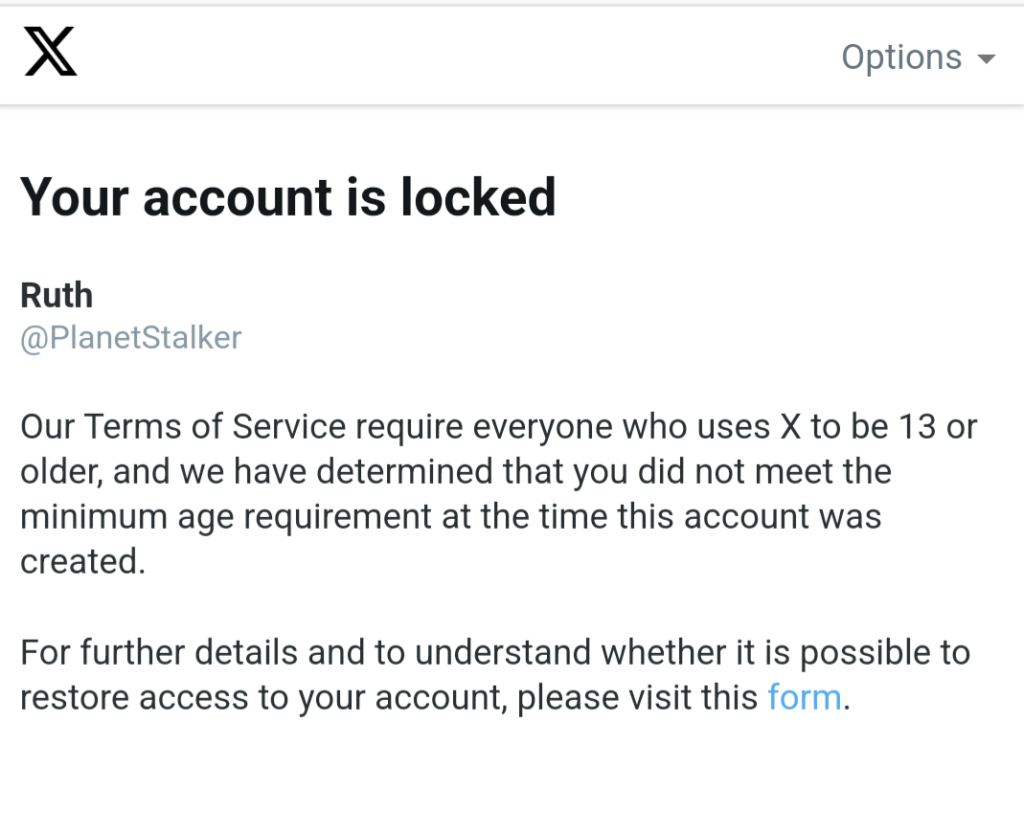
Alas, I had popped in a random date making me something like 20-years-old so apparently I would have been six or seven-years-old when I created the account, which is obviously mad, how many six-year-olds create Twitter accounts and tweet stuff until they have nearly 1k followers?
When I visited the ‘form’ it said that the only way I would get my account back was if I uploaded my driving licence, to prove that I was over 13 years of age, which is even madder as that would have made me one-years-old when I created my account. And, then depending on the age on my driving licence, it would have deleted the tweets I had made before I turned 13 were I just 20-years-old. This felt even weirder as a UK driving licence has a date of birth, address, place of birth and loads more personal information. I am sure with enough of a dig round the WWW you could find all this data anyway, but it just felt even worse to have to upload that and probably still get banned for lying about my age in the first place since I’m nowhere near 20-years-old. What can I say? The ads are way more fun.
So there it is, no more Twitter/X for me, I am slowly but surely retreating from social media and as it turns out, I am not alone.
In 2022, Cow Clicker inventor Ian Bogost, dramatically wrote in The Atlantic that the age of social media is ending. he traces the history of social media, a term he says was defined in 2009, from social networking or what Sherry Turkle referred to as emerging technologies, when people networked online and shared stuff about their own lives just to share, not curated information from newspapers nor clickbait or stuff to sell, back when journalists still wrote proper articles not just ones from a bunch to tweets and being online was just that, it wasn’t about getting hits. It was all about sharing.
I got the impression Bogost was hoping that Twitter would fail as he wrote it around the time it was up for sale. I think personally since Musk wants X to be everything financial to everyone, banking, digital purchases, checking, credit cards, investments, and loans, primarily because the banking industry was ripe for disruption. This is why he changed the name from Twitter to X, the very first company he ever founded, which then became Paypal, I shouldn’t think that X will thrive. It will just keep on being the same.
That said though, when we design something that is supposed to be everything to everyone, or it has a specific goal to claim a market share without any other goals, it invariably fails. Rather like google+ did. It was supposed to challenge Facebook’s market share but didn’t as it had no other goal. Meta in turn has been trying to turn into some mega hub where you get everyone online in one community, so that you can reach out to your dry cleaner in the same way you do your family, to use an example Zuckerberg once used, which strikes me as so peculiar, especially as he zealously guards his own privacy. I bet his drycleaners does not have him, ‘Mark’, on speed dial. This week though, Meta is trying it on again on Whatsapp with a set up a communityhub, though honestly, it makes a nice change from use our AI.
As I’ve said before, just because you create a website or an online space, it doesn’t make a community. Communities take work. Twitter never tried to be a community as Bogost says: Twitter was like the world’s largest asynchronus chatroom which is why it worked so well. Now Musk wants it to be like a town square, but with his awful tweets and reinstating banned accounts, who would want to be part of that town square?
Rather like all the rioting that has been going on across the UK over the last couple of weeks, most people have been keeping out of city centres and town squares in real life. So, why would we want to go to violent, hateful places online? As the stats show, many people have left X. Moreover, who would trust X with their financial information given that Musk is likely to incite enough hatred to burn the whole thing down and that’s before we get onto the big mishmash of long blogs, videos, tweets and advertising, that X now is. Musk himself is now sharing fake news too.
For my own part, I am both sad and glad I got kicked off Twitter, Xed from X. I will miss the very nice people who were once part of my daily life on there but I won’t miss seeing all those dreadful tweets, especially the ones from Musk.
So long X, all the very best.

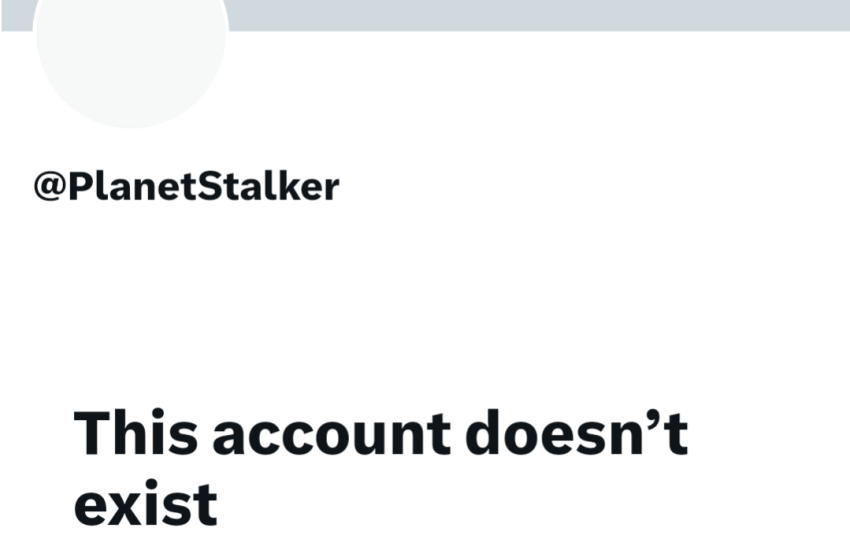


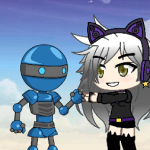
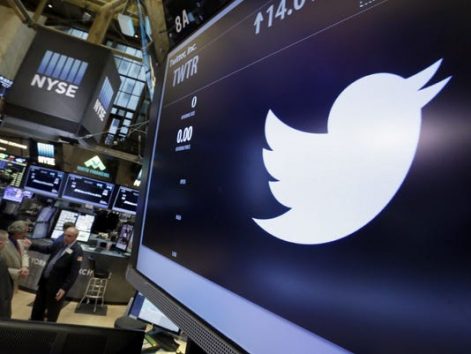
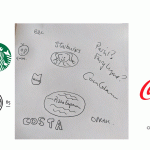
Such a great blog post. I could go on about this subject for hours but I won’t ?. I nearly came off Twitter myself because it has been so unpleasant in recent weeks. I think I will stay for the duration of the Eras tour and then leave. The article from the Atlantic is very interesting. It’s all a very strange experience for those of us who remember when Twitter was fun. (I can’t call it X.) I don’t have social media apart from that, it never seemed a positive to me, except for Twitter. It seems astonishing now but I too met lovely people on there. Glad you’re still blogging!
Thank you! Funny I finished writing this blog and thought: Mmm yes I’ll share this on X, before remembering that I got Xed. It’s a shame it’s so different now. Are you not tempted to join Bluesky or Mastodon? All the best, Ruth
Bluesky seems a possibility….but I’ll wait and see. I’m not sure what social media has to offer me at the moment and the expectation seems to be that it will get worse!